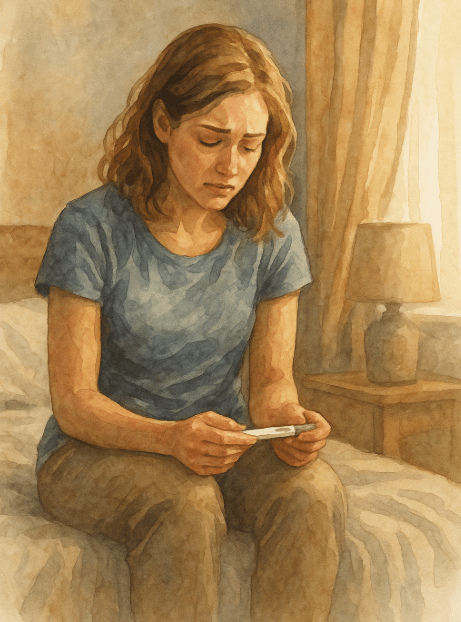Grieving Fertility Struggles: Mourning the Children Who Never Came
Grief with fertility struggles is a silent sorrow, mourning names never spoken, birthdays never celebrated, and dreams buried without a sound.

This post blends real grief with grounded knowledge. It isn’t clinical. It isn’t distant. It’s meant to sit beside you—not above you. The story you’ll read is meant to reflect what so many feel when living through or witnessing this condition: confusion, exhaustion, and quiet forms of courage.
If what you read feels familiar, please speak with your doctor. Your pain deserves more than silence.
We Built a Room for a Baby Who Never Came Home
We painted the walls a soft green. Not as a trend or to be gender-neutral, but because it felt like hope. It reminded us of spring, new beginnings, and the gentle way you speak to a child.
The crib arrived in a flat box. We assembled it on a Sunday, fueled by a bottle of optimism. He followed the directions while I held the screws. We laughed when he accidentally attached the side rail backward, and then we cried when we finished. Because at that moment, it felt real.
We were ready, ready for midnight feedings, lullabies, endless laundry, and little socks that never stayed on. Ready to love someone who didn’t yet exist.
🧠 Symptoms:
- Inability to conceive after 12 months of regular, unprotected intercourse
- Irregular or absent menstrual cycles in women
- Hormonal issues in men, such as changes in hair growth or sexual function
- Pain during intercourse or ejaculation
- Testicular pain or swelling in men
- History of miscarriages
But they never came. Not in the first month, nor the third. Not after the vitamins, the charts, the ovulation sticks, the sterile intimacy, the hot tears, and the doctor visits. Not even with the well-meaning advice of “just relax” from those who didn’t understand.
We named them anyway…each “maybe-baby.” Each negative test felt like losing someone who almost was.
There was no funeral, no service, no obituary—just an empty room and a heart that continued beating.
No one mentions how it changes a couple. How hope can begin to rot if left unchecked. The way we stopped touching, not out of desire, but because it began to feel like a transaction, like a performance, a test we kept failing together.
Complications:
- Emotional and psychological stress: Infertility can lead to depression, anxiety, and relationship strain.
- Financial burden: Fertility treatments can be expensive and not always covered by insurance.
- Multiple pregnancies: Treatments like IVF increase the risk of twins or more, which carry higher health risks.
- Ectopic pregnancy: Fertility treatments can increase the risk of a fertilized egg implanting outside the uterus.
Now, we navigate around that room. We vacuum its hallway, keep its window locked, and pass by it like a scar that remains unspoken.
Sometimes, I still crack the door open, just a little. Let the light in, let the grief breathe.
Because even though they never came home, that room still holds a version of me I find hard to release.
Causes:
- Female Factors:
Ovulation disorders: Conditions like polycystic ovary syndrome (PCOS), hyperprolactinemia, or thyroid dysfunction can disrupt ovulation. - Fallopian tube damage or blockage: Often due to pelvic inflammatory disease, endometriosis, or previous surgeries.
- Uterine or cervical abnormalities: Including fibroids, polyps, or congenital anomalies.
- Primary ovarian insufficiency: Early menopause before age 40.
- Cancer and its treatment: Chemotherapy and radiation can impair fertility.
- Male Factors:
Sperm production issues: Low sperm count or poor motility due to genetic defects, infections, or varicocele. - Ejaculation problems: Retrograde ejaculation or blockages.
- Environmental exposures: Pesticides, radiation, or overheating of the testicles.
- Lifestyle factors: Smoking, alcohol use, drug use, or obesity.
- Cancer and its treatment: Chemotherapy and radiation can affect sperm production.
- Combined or Unexplained Factors:
In some cases, both partners contribute to infertility, or no specific cause is identified.
I stopped attending baby showers. I muted half my social media feed. I couldn’t pass the diaper aisle without feeling like my body was betraying me.
We tried it all: Clomid, IUI, IVF, even “just letting it happen.” (As if that would ever help.)
Each month brought with it symptoms I questioned. Was I nauseous, or just anxious? Was I late, or merely unlucky?
He tried to stay strong, reassuring me that I was more than my womb and that his love was unconditional. Yet, I noticed the way his gaze lingered on the nursery door, how his hand paused on the unopened box of pacifiers we bought on sale…“just in case.”
Eventually, we cleared out the room. We didn’t repaint or dismantle the crib; we simply closed the door.
You don’t have to bury a child to grieve one…sometimes, the silence in the nursery is loud enough.
Risk Factors:
- Age: Fertility declines with age, especially after 35 for women and 40 for men.
- Tobacco use: Smoking can reduce fertility in both men and women.
- Alcohol consumption: Excessive drinking may decrease fertility.
- Weight: Being overweight or underweight can affect hormone production and ovulation.
- Exercise: Lack of or excessive exercise can impact fertility.
- Sexually transmitted infections: Can damage reproductive organs.
- Exposure to toxins: Including pesticides, lead, and other environmental toxins.
📘 Diagnosis & Treatment
Diagnosis:
For Women:
- Ovulation testing: Blood tests to measure hormone levels.
- Hysterosalpingography: X-ray to check the uterus and fallopian tubes.
- Ovarian reserve testing: Determines the quantity and quality of eggs.
- Imaging tests: Ultrasound to assess reproductive organs.
- Laparoscopy: Minimally invasive surgery to identify endometriosis or other issues.
For Men:
- Semen analysis: Evaluates sperm count, motility, and morphology.
- Hormone testing: Checks levels of testosterone and other hormones.
- Genetic testing: Identifies potential genetic causes of infertility.
- Testicular biopsy: Examines sperm production.
- Imaging: Ultrasound to detect varicoceles or other abnormalities.
Treatment:
Medications:
- Clomiphene citrate: Stimulates ovulation.
- Gonadotropins: Hormonal injections to induce ovulation.
- Metformin: Improves insulin resistance in women with PCOS.
- Letrozole: An aromatase inhibitor used to induce ovulation.
- Bromocriptine: Treats hyperprolactinemia.
Lifestyle modifications:
- Weight management: Achieving a healthy weight can improve fertility.
- Reducing stress: Stress management techniques may enhance fertility.
- Avoiding tobacco and excessive alcohol: Improves overall reproductive health.
Surgical procedures:
- Laparoscopic or hysteroscopic surgery: Removes endometrial polyps, fibroids, or adhesions.
- Tubal surgeries: Repairs blocked or damaged fallopian tubes.
- Assisted reproductive technologies (ART):
- Intrauterine insemination (IUI): Sperm is placed directly into the uterus.
- In vitro fertilization (IVF): Eggs and sperm are combined in a lab, and embryos are transferred to the uterus.
- Intracytoplasmic sperm injection (ICSI): A single sperm is injected directly into an egg.
- Donor eggs or sperm: Used when one partner has no viable gametes.
- Gestational carrier: Another woman carries the pregnancy.
I know this is heavy, and I understand that the road ahead may feel like a tangle of loss and unanswered questions. But please hear this: you are not broken because you are hurting; you are not weak because you are afraid. You are living through something real, and survival itself is a kind of grace. You are allowed to struggle, you are allowed to hope, and you are allowed to not have all the answers today. Whatever comes next, you do not face it empty-handed; you carry every moment of love that shaped you, and that will always be enough to keep going.
🎀 Gifts to help With Fertility Struggles
🏥 Everyday Comforts for Everyday Battles
Managing Fertility Struggles often means needing a little extra help.
Sometimes it’s about restoring dignity, ease, or simply getting through the day with less pain.
These carefully chosen tools aren’t just items; they’re small bridges back to living.
This section is about finding practical support, never shame.
Fertility & Cycle Tracking Journal – A Place to Grieve, Track, and Try Again
Infertility turns time into a weapon, every month measured in blood, hope, and heartbreak. This guided journal offers a structured, private space to track ovulation, cycles, procedures, and symptoms while also holding the emotional toll. It’s not just data. It’s ritual. A soft place to land when your body keeps you waiting.
🌿 Paths to Healing Beyond the Map
Sometimes traditional medicine isn’t enough.
If you’re exploring gentle, alternative options to help with Fertility Struggles,
you might find comfort in plant-based compounds like **CBD or CBG**.
*This section is not medical advice, just a door left open.*
USA Medical Hormonal Balance Support (Total Pack) – Calm in a Cycle That Feels Out of Your Hands
When the body won’t cooperate, the mind suffers with it. This Total Pack combines CBD, stress support, sleep aid, and immunity support—offering calm during hormone storms, failed rounds, and late results. It won’t make you pregnant. But it might make surviving the process a little more bearable.
Need a Different Path Forward?
Every journey through grief looks different. Choose the next step that speaks to where you are now:
When You're Ready to Start Healing
Healing doesn’t mean forgetting.
It means finding small ways to carry your grief with strength and grace.
These are the stories, tools, and gentle steps to begin walking forward…at your own pace.
When You're Still in the Thick of It
Sometimes healing feels like a lie.
If you’re not ready to move on…if the pain still roars louder than the world wants to hear…this is the place where you’re allowed to feel it.
No sugarcoating. No pretending. Just truth.
When You're Holding on to Who’s Still Here
Grief reminds us to love louder.
If someone you love is still with you, this is your place to celebrate them, honor them, and create new memories while there’s still time.
Joy and sorrow can live side by side.






